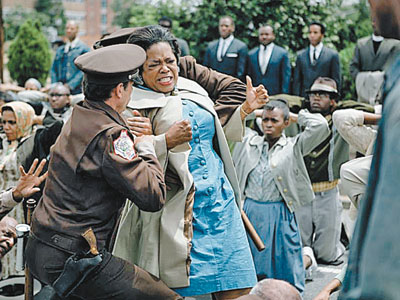|

《塞尔玛》
Until now, no feature film has been made about Martin Luther King Jr. Whether that’s because the murdered civil rights leader’s story was too rich or because some of his most important speeches can’t be recreated because of legalities; the closest Hollywood has come is a 1978 TV movie.
“Selma” is a surprise. Director Ava DuVernay and writer Paul Webb focus on King’s 1965 battle for voting rights and his political pressure on President Lyndon Johnson to end the systemic oppression* of black Americans. This is a clever approach* to an emotional* issue.
The film opens with a big picture of the era’s struggle, horror and headlines*: Little girls are victims of a church bombing. Annie Lee Cooper (Oprah Winfrey) is asked impossible questions before being told she cannot register* to vote. And King (David Oyelowo), still just an Atlanta minister at heart, is in Sweden with his wife Coretta (Carmen Ejogo) to receive the Nobel Prize.
When he returns to the United States, King urges Johnson (Tom Wilkinson) to pass voting rights, a bedrock of equality*. Governor George Wallace (Tim Roth) and his Alabama state troopers are against him. That helps make Selma the perfect place to start.
King also meets resistance* from Selma’s Southern Christian Leadership Conference, which he helped found and whose leaders have other plans. Finally, King and his team — including Andrew Young (Andre Holland), Amelia Boynton (Lorraine Toussaint) and James Bevel (Common) — decide a march is the best way to reach their goal of making America wake up. That it does, and Johnson is forced to take action after 1965’s Bloody Sunday, on March 7, when peaceful marchers are inhumanly beaten by Alabama troopers on the Edmund Pettus Bridge.
DuVernay, an indie filmmaker making her first big studio film, gracefully shows the strategies*, negotiations* and meetings that made a dream possible. If we’re never quite inside King’s head, we are right beside him as the weight of history, and the hope of good people, falls on him.(SD-Agencies)
|

